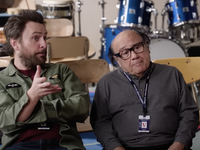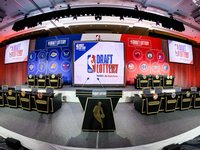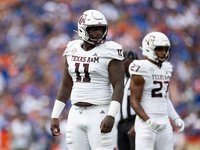The Sixers are trading Jonathon Simmons to the Washington Wizards along with pick No. 42 in the 2019 NBA Draft in exchange for cash considerations, a team source confirmed to PhillyVoice on Thursday night.
Philadelphia's official company line on the move is that it enhances Philadelphia's cap room for free agency this summer, and that is true to a certain extent. But since Simmons only had $1 million guaranteed to him this summer (he would have made up to $5.7 million if the Sixers had for some reason decided to guarantee his contract), this cap saving may actually be directed at a specific scenario.
- MORE ON THE SIXERS
- NBA Draft 2019: Sixers trade up to No. 20 to select Matisse Thybulle
- Live updates/open thread: 2019 NBA Draft
- Elton Brand, Sixers looking for prospects who can contribute to title push
Functionally, saving the $1 million vs. cutting Simmons outright only matters if the Sixers lose one of their top free agents this summer. If they are bringing both back, they will be functioning as an over-the-cap team, so this move to get Simmons' small amount of money off of the books could be viewed as preparing for the scenario where they lose one (or perhaps both) of Jimmy Butler and Tobias Harris.
Even in a world where the Sixers keep both players, there may be a bigger-picture reason to get that extra money off of the books. Above the luxury tax threshold is an area called the "apron," which starts a new level of restrictions for teams in the team-building process.
Those restrictions are as follows:
- Teams above the apron are no longer able to use the bi-annual exception to sign players
- Teams above the apron have a smaller mid-level exception to use on free agents. For reference, the non-taxpayer MLE in 2018-19 had a starting salary of about $8.6 million, while the taxpayer MLE started at around $5.3 million
- Teams above the apron cannot acquire players in sign-and-trade deals
- Teams above the apron are not protected the same under the Gilbert Arenas provision
In other words, staying under the apron matters for flexibility purposes. Is that $1 million going to be the difference for the Sixers there? It's hard to say from where we sit today, as the contracts for all of their major players have not been decided yet.
A more cynical view of the trade would say this is just a way for the Sixers owners to save a little money. The Sixers have sold off numerous picks in the last few years, including ones that turned into rotation players around the league. Milwaukee's Sterling Brown stands out in that regard — the Sixers gave him up for cash considerations during the 2017 draft, and he has turned into a nice three-and-D player for the Bucks.
Money is only as useful as what you buy with it. If this $1 million goes toward keeping the band together, Sixers fans will rejoice. If it's a way to put more fuel in Joshua Harris' helicopter, I doubt they'll be as pleased.
Follow Kyle on Twitter: @KyleNeubeck
Like us on Facebook: PhillyVoice Sports






